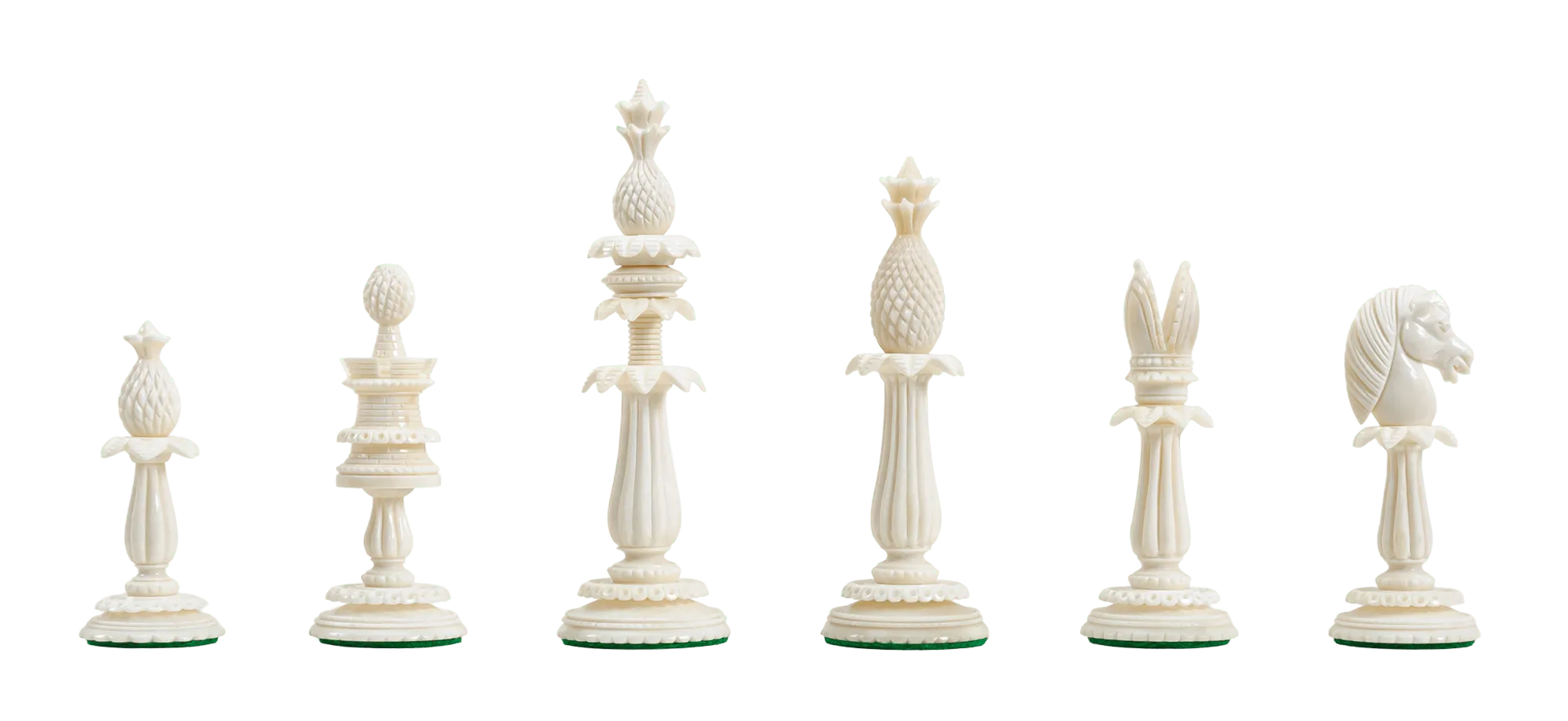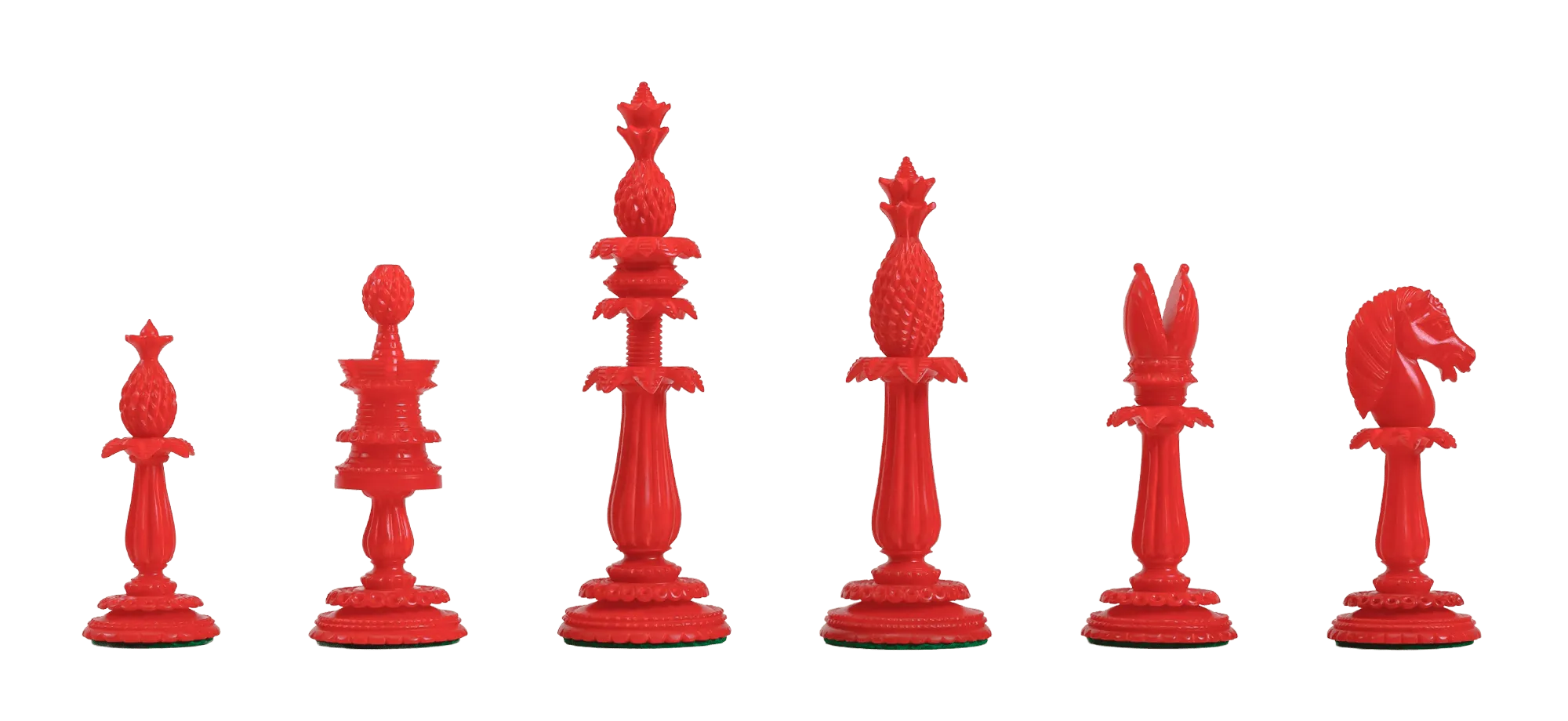Step 1 - Select Pieces
 Red and Natural Bone
Red and Natural Bone


Step 2 - Would you like to Add a Board?
Do not add a board

Tournament
Our Tournament Wood Chess Boards are affordable, ideal for both serious and casual play, and feature House of Staunton Logo.
Savings of $10
When Bundled with Chess Pieces

Standard
Our Standard Wood Chess Boards offer the perfect combination of affordability & luxury, and are available in a variety of woods.
Savings of $20
When Bundled with Chess Pieces

Superior
Our Superior Wood Chess Boards are designed for the discerning player, crafted in Europe from exotic woods.
Savings of $20
When Bundled with Chess Pieces

Signature
Our Signature Wood Chess Boards are handcrafted out of solid woods and are the finest chess boards available.
Savings of $50
When Bundled with Chess Pieces

eBoard

Step 3 - Would you like to Add a Box?
Do not add a box

The Lund Anglo-Indian Reproduction Luxury Bone Chess Pieces - 4.75" King
THIS ITEM IS IN STOCK!!

PRICE MATCH GUARANTEE
Found this item at a lower price elsewhere? We'll match it!* Certain restrictions apply.
To pamper you, The House of Staunton is proud to offer the Lund Anglo-Indian Reproduction Luxury Bone Chess Pieces. This full Club-sized Chess set features a 4.75" King with a 1.5" diameter base. The Chess pieces are hand carved by our master artisans and crafted out of the highest camel bone. As with all of our Chessmen, the Lund Anglo-Indian Reproduction Luxury Bone Chess Pieces exemplifies a perfect combination of distinct beauty and functionality. The design, quality and craftsmanship of this set is UNMATCHED by any set of Chessmen in its price range. Nothing even comes close!
The Chessmen are new and each set consists of 32 Chessmen.
-
ISBN
-
Does not apply
-
King Height
-
4.75'' inch / 12.07 cm
-
King Base Diameter
-
1.5'' inch / 3.81 cm
-
Basepad Material
-
Billiard Cloth
-
Material(s)
-
Camel Bone
-
Median Set Weight
-
Natural Bone - No Additional Weighting
-
Total Number of Pieces
-
32 Chess Pieces
-
Fitted Coffer Compatible?
-
Will Not Fit in any Coffer
-
Included with Purchase
-
Certificate of Authenticity, Engraved Registered Plaque, and Individual Production Number
-
Chess Board Included?
-
The Chess Board featured is for photographic purposes only and must be purchased separately
-
Recommended Chess Board Size
-
2.5" inch / 6.4 cm
Included with Purchase
- Certificate of Authenticity
- Engraved Registered Plaque
- Individual Production Number
Warranty
History of the Chess Pieces
India has a rich association with chess. The modern version of chess is linked to an earlier version called Shatranj that evolved in Indian from around the 6th century AD, which is thought to have been derived from an earlier game called Chaturanga. India had the materials and expert craftsmen needed to make fine objects and chess sets were a natural fit.
The British East Indian Company was setup in India in the early 1600s and by the later part of the 1700s they controlled much of India’s exports. A vast amount goods were created in India and exported to Europe (mostly Britain) to fulfill demand. The lower cost of skilled labor in India allowed the items to be priced competitively. The majority of their chess sets were created for, and targeted at, the export market where demand was strong. This affected the design and themes of the sets themselves, which were often very elaborately carved and turned. The majority of sets created in the 18th and 19th century were decorative playing sets carved and turned from ivory.
In order to compete in their own British marketplace against the flood of Indian-made chess sets using cheap Indian labor, many of the established English craftsmen turned to copying or modifying the more elaborate Indian chessmen designs that were being imported and adding features and embellishments of their own, such as distinctive Knight heads and rusticated pedestal Rooks. One of these English manufacturers was Thomas Lund. His workshop was located at 57 Cornhill, London. His sets were often stamped “ THOMAS LUND Maker 57 CORNHILL”. His son, William Lund, was located at 23-24 Fleet Street. Thomas Lund had several occupations, but one of them was the manufacture of chess sets from the early 1800's until his death in 1843. William Lund, Thomas' son, continued to make sets throughout the rest of the 19th century, and is one of the most well-known of the manufacturers. This particular style was most likely made by Thomas Lund.
THESE ARE ACTUAL HAND CARVED BONE CHESSMEN































